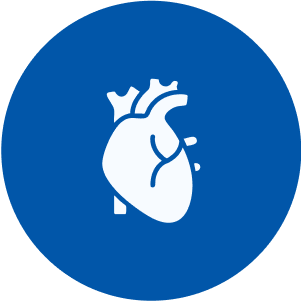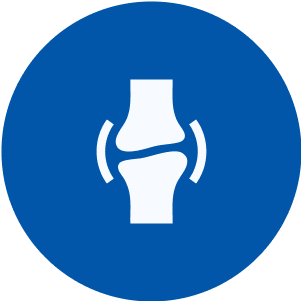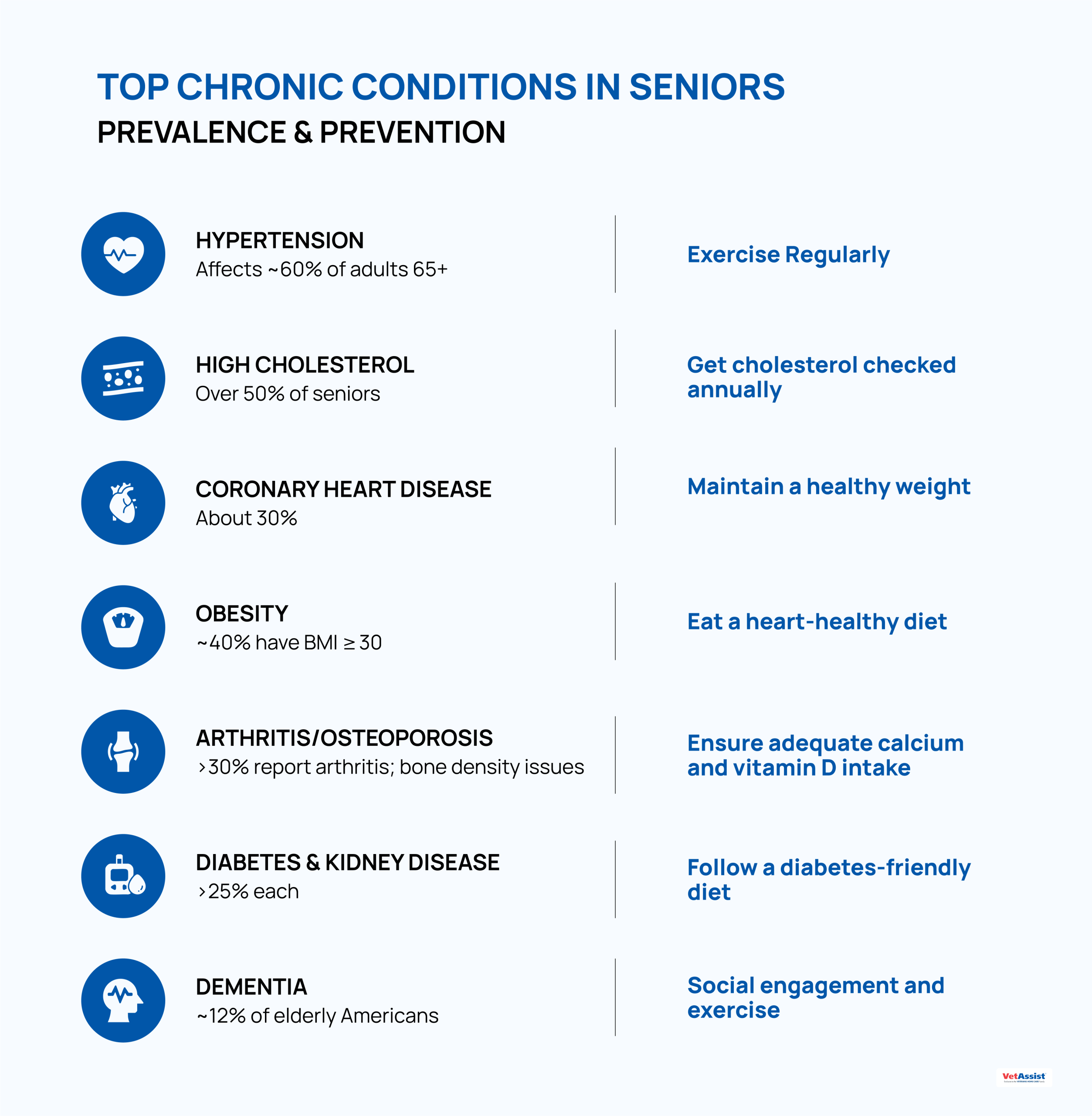Elderly Ailments: The Biggest Health Concerns and Risks for Seniors
According to the World Health Organization (WHO), 2020 was the year when the global population over age 60 surpassed the population under age 5. By 2050, individuals aged 60 and up will make up about 22% of our world’s population, and those aged 80 and up will number a whopping 426 million. Aging and health is therefore becoming a more relevant topic than ever, with more attention needed to prevent, diagnose, and treat age-related illnesses and common elderly health issues.
The National Council on Aging (NCOA) estimates that almost 95% of American adults aged 60+ have at least one chronic health condition, while almost 79% have two or more. Though not limited to diseases of aging, we are gaining more insights on the most common chronic health challenges for seniors and how lifestyle factors and early detection can lead to better outcomes and a higher quality of life.
The Most Common Chronic Medical Conditions in Seniors—and How to Reduce Your Risk
As of 2024, NCOA has identified the following as the most prevalent health concerns for seniors.
Heart and Circulatory Ailments
 The most common chronic diseases in older adults affect the circulatory system. These illnesses include hypertension, high cholesterol, coronary heart disease, and heart failure.
The most common chronic diseases in older adults affect the circulatory system. These illnesses include hypertension, high cholesterol, coronary heart disease, and heart failure.
- Also known as having high blood pressure, hypertension is a common ailment that affects 60% of seniors aged 65+. Arteries become strained as the heart pumps blood through the body, which increases the risk of heart attack and stroke.
- Just over half of seniors suffer from high cholesterol. High cholesterol levels interfere with blood flow through the arteries, which also increases the risk of heart attack and stroke.
- Coronary heart disease is also known as ischemic heart disease. Affecting almost 30% of seniors, this common condition is tied to high cholesterol and blood pressure. Plaque builds up in the arteries, reducing blood flow to the heart and increasing the risk of heart attack, blood clots, and angina (chest pain).
- Heart failure is a severe condition that affects about 5% of older adults. With time, untreated coronary heart disease and high blood pressure can lead to an enlarged heart or increased pumping to supply adequate blood to the body’s organs. A senior with heart failure may feel light headed, confused, or nauseated and will require medication to support circulation.
Outside of genetic factors and the risks that come with advancing age, circulatory ailments can be prevented or improved with lifestyle choices. It is important to maintain a healthy weight (see details on obesity below); avoid alcohol and tobacco; exercise daily for about half an hour; and manage stress levels. Healthy nutrition can make a big difference when including whole, nutritious foods and avoiding cholesterol, saturated or trans fats, and salty foods. Blood pressure may be monitored at home, and your doctor may prescribe medication to help with lowering blood pressure and/or cholesterol.
Obesity
 Obesity is defined as a body mass index (BMI) of 30 or higher, which is present in about 40% of American seniors. Its status as an age-related disease is relatively new, but it is considered to be an important contributor to the severity of many geriatric diseases and chronic conditions. It is known to worsen outcomes for heart disease, diabetes, stroke, and cancer, among others, and can contribute to sleep apnea and joint pain.
Obesity is defined as a body mass index (BMI) of 30 or higher, which is present in about 40% of American seniors. Its status as an age-related disease is relatively new, but it is considered to be an important contributor to the severity of many geriatric diseases and chronic conditions. It is known to worsen outcomes for heart disease, diabetes, stroke, and cancer, among others, and can contribute to sleep apnea and joint pain.
Enough research has shown obesity to be dangerous to health that treatments for it (such as nutrition counseling and bariatric surgery) are covered by Medicare. Seniors who are overweight (BMI from 25-29.9) should consult a doctor about losing weight to avoid a higher risk for common health problems in old age.
Arthritis and Bone Disease
 Arthritis affects over a third of seniors and occurs when joints become inflamed, resulting in pain and stiffness. This can develop over time, especially for seniors who are not physically active or who have suffered an injury. Regular exercise and physical therapy can go a long way to both alleviating and preventing arthritis.
Arthritis affects over a third of seniors and occurs when joints become inflamed, resulting in pain and stiffness. This can develop over time, especially for seniors who are not physically active or who have suffered an injury. Regular exercise and physical therapy can go a long way to both alleviating and preventing arthritis.
Related issues with bone density, such as osteoporosis, are also common in seniors. Bone density can be maintained with weight-bearing exercise, good nutrition, and sometimes supplements like calcium and vitamin D. Seniors with a higher risk of falling might benefit from assistive devices for moving around safely.
Diabetes
Type 2 diabetes is a common chronic health condition where the risks increase with advanced age. Over a quarter of seniors are treated for diabetes. This illness develops as the body becomes resistant to insulin, an important hormone released when we eat; insulin turns sugar in our food into energy, and when this process fails, we are left with dangerously high levels of blood sugar. Older individuals are more likely to develop diabetes and experience related complications such as kidney or heart disease, blindness, and loss of digits or limbs.
As with other conditions, diabetes risk and intensity can be reduced with lifestyle changes such as eating a healthy diet, avoiding alcohol, and exercising regularly. Your annual physical may include a blood panel that can detect high blood sugar early to prevent a diabetes diagnosis down the line. Once a diabetes diagnosis is made, it is important to follow your doctor’s instructions for monitoring blood sugar and taking any needed medications.
Kidney Disease
Chronic kidney disease also affects about a quarter of seniors. Kidneys are the body’s blood-filtering system, clearing waste and excess fluid from the bloodstream. When kidneys fail (which happens when kidney disease goes untreated), the senior patient needs dialysis to do the work of filtering.
Kidney disease can be tricky to spot early. A classic sign is increased frequency of urinating (often during the night), but with less urine. It can also come with muscle cramps, fatigue, and swollen limbs. Development of kidney disease is highly influenced by untreated high blood pressure or diabetes, so prevention of those conditions is important.
Cognitive Decline and Memory Loss
 Alzheimer’s and other conditions causing dementia are very difficult to live with. While dementia will not affect all seniors and is not considered a normal part of aging, it affects about 12% of elderly Americans.
Alzheimer’s and other conditions causing dementia are very difficult to live with. While dementia will not affect all seniors and is not considered a normal part of aging, it affects about 12% of elderly Americans.
Early detection of memory issues and cognitive decline can help the senior and their family make a plan for maintaining quality of life. Certain activities like regular exercise (notably, dancing) and sound sleep (seven or more hours per night) may slow cognitive decline. For seniors living independently, a home safety audit can help prevent household accidents that become a greater threat with attention and memory issues.
7. Mental Illness
 Because of frequent isolation, seniors can be prone to depression and other mental illnesses which jeopardize their quality of life and even their physical health. NCOA estimates that about 16% of older adults are treated for depression.
Because of frequent isolation, seniors can be prone to depression and other mental illnesses which jeopardize their quality of life and even their physical health. NCOA estimates that about 16% of older adults are treated for depression.
Loneliness increases seniors’ risk of mortality by 26%. Many suffer from difficulty adapting to changes from aging, such as retirement from work or loss of mobility. They can struggle to find purpose as their daily activities and opportunities diminish. As much as possible, older loved ones should be checked in on regularly, included in family and community activities, and connected with hobbies, volunteerism, religious services, and targeted senior groups.
Though most seniors live with at least one chronic health condition, it is important to focus on the controllable factors that can help improve their prognosis and quality of life. If your loved one is at a stage of needing home care, our VetAssist mission is to make home care easily and quickly accessible for those who qualify through the VA Pension with Aid and Attendance benefit. Veterans Home Care can help you determine whether you or your loved one will be eligible to receive the benefit, which can cover some or all of the cost of home care, and we make it easy to apply. Chat with us via our website, or call us at (888) 314-6075.


















